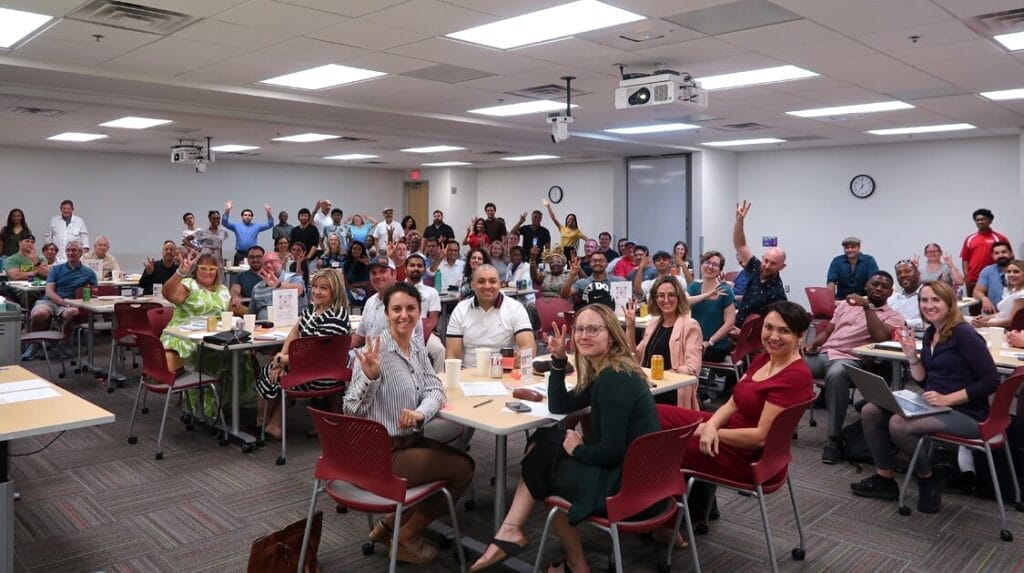
Entrepreneurs looking for support often hear the term “incubator,” but descriptions of these programs are often vague and packed with complex terms. We’re excited to show you how entrepreneurs can benefit from incubators, how they work, how to sort through different types and how to join an incubator that meets you where you are.
How an Incubator Can Help Your Business
Incubators are most helpful for early-stage entrepreneurs with a well-defined idea and are looking to learn more about their customers and market, build out their product or service, solidify their business model, and start getting traction with initial sales. Though many incubators don’t cater to nonprofits, some do provide support with the specific needs of these organizations in mind. The benefits of incubators can vary, but the Edson E+I Institute helps both for-profit and nonprofit founders with:
- Fast-track progress on building a business or nonprofit.
- Navigate challenges and reduce risk.
- Find collaborators, business opportunities and a personal support system.
- Fund early expenses like product development and marketing.
- Reduce costs for key resources like working space, technology tools and legal services.
What You Can Expect from an Incubator
While traditional incubators have a highly competitive application process and require participants to commit to a weekly series of evening or weekend workshops for several months, more inclusive models like those from the Edson E+I Institute offer open-access formats that skip the formal application and allow participants to just focus on the specific areas they want help with. The exact mix of services, activities and resources that deliver benefits to participants varies depending on the incubator but those developed by the Edson E+I Institute include:
- Self-guided digital resources with highly effective approaches to building a business or nonprofit that help an entrepreneur to plan and execute effectively.
- Monthly interactive sessions on rotating topics. Participants collaborate with mentors and guest experts on specific areas of their business or nonprofit to fast-track progress with targeted feedback. These sessions also enable participants to build relationships that can lead to collaborations, business opportunities, and a personal support system.
- Mentorship from experienced entrepreneurs who can offer dedicated, ongoing support with regular check-ins and access to a wide network of technical and industry experts for focused support meetings as needed. Their advice helps entrepreneurs navigate challenges and make informed decisions that reduce risk while fast-tracking progress on building a business or nonprofit.
- Pitch competitions that provide opportunities for entrepreneurs to showcase their businesses or nonprofits in front of a panel of expert judges and the greater community. Entrepreneurs receive feedback, gain recognition, hone their pitching skills and compete for funding. These competitions are one of the few sources of funding for early expenses that do not need to be paid back and do not take any equity/ownership in the business or nonprofit.
- Free or low-cost access to maker spaces, legal support, co-working spaces, specialized laboratories and equipment and even dedicated office space at some locations. By keeping overhead costs low, entrepreneurs can focus on building their business or nonprofit, leading to faster progress.
- A digital community platform that allows participants to create a profile and connect with fellow participants as well as the broader network of incubators and global programs. The platform also acts as a centralized hub for program resources and tracking venture progress. This makes it easier to find collaborators, business opportunities, and a personal support system.

Photo: Brenda Noggy of TrialNav
Meet Brenda Noggy of TrialNav
TrialNav is a groundbreaking platform, aligning cancer research trial protocols with staffing requirements to minimize trial abandonment and enhance staff retention.
Under the guidance of Chandler Endeavor, Brenda is actively engaged in mentorship sessions with our mentor, Glenn Thomas. Through collaboration, they are addressing corporate formation, refining business plans, establishing platform pricing strategies, and developing their investment pitch. As Brenda diligently works towards launching their fundraising campaign, we’re excited to witness the growth of TrialNav and their future application for an office space in our dedicated facility.
Types of Incubators
All these valuable benefits might have you ready to join your nearest incubator! But, there are a lot of different types of incubators, so it can be helpful to ask some key questions to check if an option is a good fit.
- Does this incubator charge a fee or take equity/ownership?
While the Edson E+I Institute incubators never charge a fee or take any equity/ownership percentage, a lot of other incubators do (even nonprofit incubators can charge to help offset their costs). It is crucial to ask about this before joining an incubator to make sure.
- Is this incubator focused on a specific industry?
Some incubators offer general support while others have developed a specialized mix of services, activities and resources to support entrepreneurs in a specific industry or set of industries. These industry-specific incubators may also only accept entrepreneurs who are in these focus industries. The Edson E+I Institute has both general and industry-specific incubators. If you need specialized support, it can be helpful to ask an incubator if they have that expertise or resource.
- Does this incubator’s format and time commitment fit my needs?
There are a lot of different incubator options, so aim for one that best balances your work/life needs and offers the kind of support that you need to move your business or nonprofit forward. Some key features to ask about include whether the incubator offers cohort-based admission or rolling admission, if in-person attendance is required or if there are virtual or hybrid options, if the program is synchronous (live) or asynchronous (recorded or self-directed), if the program has a set curriculum or if it is customizable to your own needs and if it offers the type of support you are looking for.
- What is the community like and how is success defined?
Some incubators pride themselves on being extremely competitive and applying intense pressure with the hope of producing a few billion-dollar companies. Other incubators, like those developed by the Edson E+I Institute, focus on creating a supportive, collaborative community that recognizes that all entrepreneurs are on their own path and that success should be collaboratively defined. Community is one of the most important features of an incubator, so it is important to ask what it is like and how success is defined.
- What happens after the program?
Entrepreneurs often need additional support after an incubator to work on next steps like improving consistency, refining their business model, and scaling to reach new markets. Some organizations offer additional support through more advanced programs called accelerators as well as ongoing events and mentorship opportunities. The Edson E+I Institute, for example, has events, resources and programs for each stage of an entrepreneur’s journey from events designed to spark ideas to advanced mentorship for selling business to investors.
Learn More about Local Incubators
There are a lot of local incubators to explore. Some of the upcoming opportunities from the Edson E+I Institute as well as community partners include:
- Chandler Endeavor Venture Innovation Incubator: An incubator from the Edson E+I Institute advancing the development of early-stage and growth-stage ventures throughout the valley.
- FABRIC: A fashion incubator, business accelerator, design studio, academy, and manufacturer that is sustainably disrupting, redefining and reshoring the fashion industry.
- SEE ME: A program from ARG Cultivators Community designed to assist Black-owned businesses in Arizona.
- Amor Collective: A unique incubator and collective retail space exclusively designed for Latina-owned businesses.
The Edson E+I Institute team is here to help if you have questions about incubators or anything else about entrepreneurship! We are happy to schedule virtual one-on-one time to learn more about what you want to build and to see how we can help—whether you are a student, faculty or staff member, and even if you do not have any connection to ASU at all. Feel free to reach out to us at [email protected].


